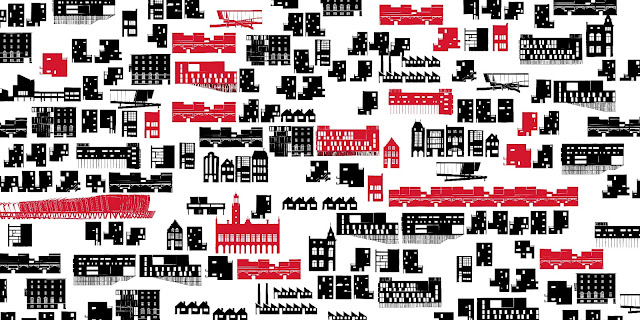works of a graphic design course at the 'academie voor beeldende kunsten mol' and other experiments
zaterdag 28 december 2013
dinsdag 8 oktober 2013
maandag 7 oktober 2013
KORTRIJK
Kortrijk
is located at the river Leie, it has its historic core on the small Buda Isle
in the middle of the river and is encircled by the almost perfect circle of its
ring road. However, this radio-concentric image is deceptive. A dizzying
atmosphere of dispersed regional and global entities – which has left the inner
city porous with vacant sites – threatens the value of the inner city’s
centrality. Counterintuitively Kortrijk is not a radio-concentric city, but
reveals a ladder structure between the regional connectors of the Leie and the
E17 with perpendicular to these axes the local north-south connections.
Perhaps these north-south rungs of the ladder can succeed where the circular figure of the ring road failed: to span the city and stitch the successive expansions of Kortrijk back together. The city is no longer a radial bullseye with a dense urban heart, surrounded by ever more open rings to end in the open countryside, but instead a hybrid city form within the ladder frame. In this way a subforest becomes part of both city and countryside by mixing forest and fields – agroforestry – and forest and houses – allotment forestry. By abolishing the redundant west-ring the gap left by the oversized car infrastructure could complete this image: Instead of having green villages with tree-filled gardens, it becomes a forest with clearings for the villas. Emphasizing the strengths and diversity of the sprawling city rather than superimposing an outdated view of the quintessential city, reveals an otherwise unnoticed wealth of this new kind of city form.
Thomas Willemse
October 2013
Perhaps these north-south rungs of the ladder can succeed where the circular figure of the ring road failed: to span the city and stitch the successive expansions of Kortrijk back together. The city is no longer a radial bullseye with a dense urban heart, surrounded by ever more open rings to end in the open countryside, but instead a hybrid city form within the ladder frame. In this way a subforest becomes part of both city and countryside by mixing forest and fields – agroforestry – and forest and houses – allotment forestry. By abolishing the redundant west-ring the gap left by the oversized car infrastructure could complete this image: Instead of having green villages with tree-filled gardens, it becomes a forest with clearings for the villas. Emphasizing the strengths and diversity of the sprawling city rather than superimposing an outdated view of the quintessential city, reveals an otherwise unnoticed wealth of this new kind of city form.
Thomas Willemse
October 2013
dinsdag 11 juni 2013
CONEY ISLAND
ISLAND OF ISLANDS
It seems as if history repeats itself at the narrow peninsula
of Coney Island where the strange juxtaposition of enclosed escapist realms was
cleared once again. Quintessentially a natural refuge for the people of the
ever-denser Manhattan, with its wide shores, salt marshes and the exceptionally
large population of rabbits – or konijnen in Dutch – that gave it its name, the
island soon had to cope with an overpopulation of people instead. The island
had to transform itself into something new to keep on offering a place of
escape and refuge; it became something super-natural. It turned itself into the total opposite of nature to counteract the artificiality of the metropolis. New closed-off islands take shape: Steeplechase Park, Luna
and Dreamland, their extra-terrestrial, highly artificial and fragile
atmospheres shielded from their surroundings. At the same time another
locked-off world is created a little further: Sea Gate, a private gated
community of single-family homes, equally turning its back to its neighbors.
The mere geographical and natural separation of the island no longer suffices
to escape from the metropolis; new small realms are formed in its interior, all
carrying that spirit of stepping outside the every-day life. However, the ‘End
of the World’ attraction of Dreamland literally becomes this world’s end when
it short-circuits in May 1911 and starts a fire that burns Dreamland to the
ground. Three years later Luna Park too goes up in flames. A lone rollercoaster
stands in the ashes of the cleared ‘super-natural’: a first clearance in its
history. The gap is rapidly closed by city planner Robert Moses when he creates
new un-natural enclaves by transforming fifty percent of Coney Island into
parks.
However, in October 2012 the shores of the island were once
again swept clean, this time by Hurricane Sandy. The remaining fun fair was
once more heavily hit, leaving the rollercoaster in the middle of a sea of
water this time. Sea Gate was struck by an equal force of water that swept
through many of the beach houses. But something else has also happened: the
artificial barriers, protecting the ‘super-natural’ inside, have been breached,
blurring the escapist ambitions of one realm with those of another. The
‘naturally restored’ dunes of the Coney Island Creek Park shifted and buried
the delineating fence of Sea Gate – and the lower levels of some houses –
erasing this once so sharp border. Yet perhaps even stronger breaches were
slashed in the social barriers, bringing alienated neighbors back together in the recovery afterwards. Perhaps some bridges will remain between the
islands, even if the ever-shifting sands reveal the physical barriers once
more.
Thomas Willemse
April 2013
zondag 10 februari 2013
Fragments of Cities
Everybody forms an idea of a city in his mind, a fragmented concept made up of an amalgamation of encounters with the city, of experiencing, reading, designing, imagining, ... cities. Here follows my personal account ...
Click on the image above for an interactive view on the city ... - created for 'Global Exchange Combodia'
Click on the image above for an interactive view on the city ... - created for 'Global Exchange Combodia'
Abonneren op:
Reacties (Atom)







